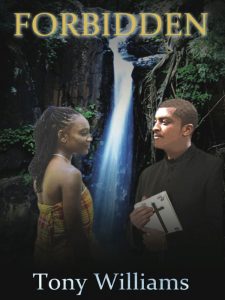
This is a look at the population of the Caribbean with black slaves, and their stubborn refusal to give up their culture, even under pressure from the English and the French, and the Church. We are introduced to the various peoples who populated, conquered, ruled and were absorbed by the fictional Caribbean island of St. Helen. But St. Helen is a prime example of how all the islands were populated during that time.
I was intrigued by the book and looked into the author’s background for validation of the story. Anthony Williams is a journalist born in Castries, Saint Lucia, and has managed his family’s plantation. The man knows how to research his material and he writes a powerful story. Having discerned that Mr. Williams does know the history of the Caribbean Islands, the book takes on an even greater depth. As you are swept away across the generations from the mid 1700s to the present day, the descriptive abilities of the writer take you deep into the plot.
Admittedly, I found myself lost a couple of times. Battle descriptions that were intense and too detailed detracted from the movement of the story. It’s not uncommon for an author writing an epic of this magnitude to go off on tangents and neglect the characters. And this book is no exception. I took away from this book more about Caribbean class and society than I did about the characters. The book explores color, race, heritage and religion as it clashes with the various cultures – indigenous, French, African, and English – with themes covering forbidden relationships to forbidden religion. It is a generational novel, and you just become familiar with one group of characters before you are introduced to the next. I wish there had been some kind of lineage table as a reference, as it can be difficult to keep track of so much detail.
But that is normal for a book like this, which, overall, is an amazing achievement. I was impressed by the stories within stories, the look and feel of the topic and setting, and the amount of research it must have taken. I was fascinated from a cultural history standpoint and I was impressed with how the characters helped the reader visualize a complete and detailed society; a very complex society that does require a close examination to fully comprehend. I hope we see more along this line from Mr. Williams. This was a very enjoyable and enlightening book.
Links
Get an Editorial Review | Get Amazon Sales & Reviews | Get Edited | Get Beta Readers | Enter the SPR Book Awards | Other Marketing Services






















This is a fantastic review of Tony Williams’ book “Forbidden”. I am particularly intrigued with Tony’s literary style, his approach to the documentation of history. It is a fascinating approach to making his readership relive the experiences of our Caribbean ancestors in what is written as the most compelling narrative of our time and location in the Caribbean and by extension St. Lucia. For persons and students interest in Caribbean history and slavery in the Caribbean “Forbidden” is a must read. In am in total support of your review.
This is a fantastic review of Tony Williams’ book “Forbidden”. I am particularly intrigued with Tony’s literary style, his approach to the documentation of history. It is a fascinating approach to making his readership relive the experiences of our Caribbean ancestors in what is written as the most compelling narrative of our time and location in the Caribbean and by extension St. Lucia. For persons and students with interest in Caribbean history and slavery in the Caribbean “Forbidden” is a must read. I am in total support of your review.